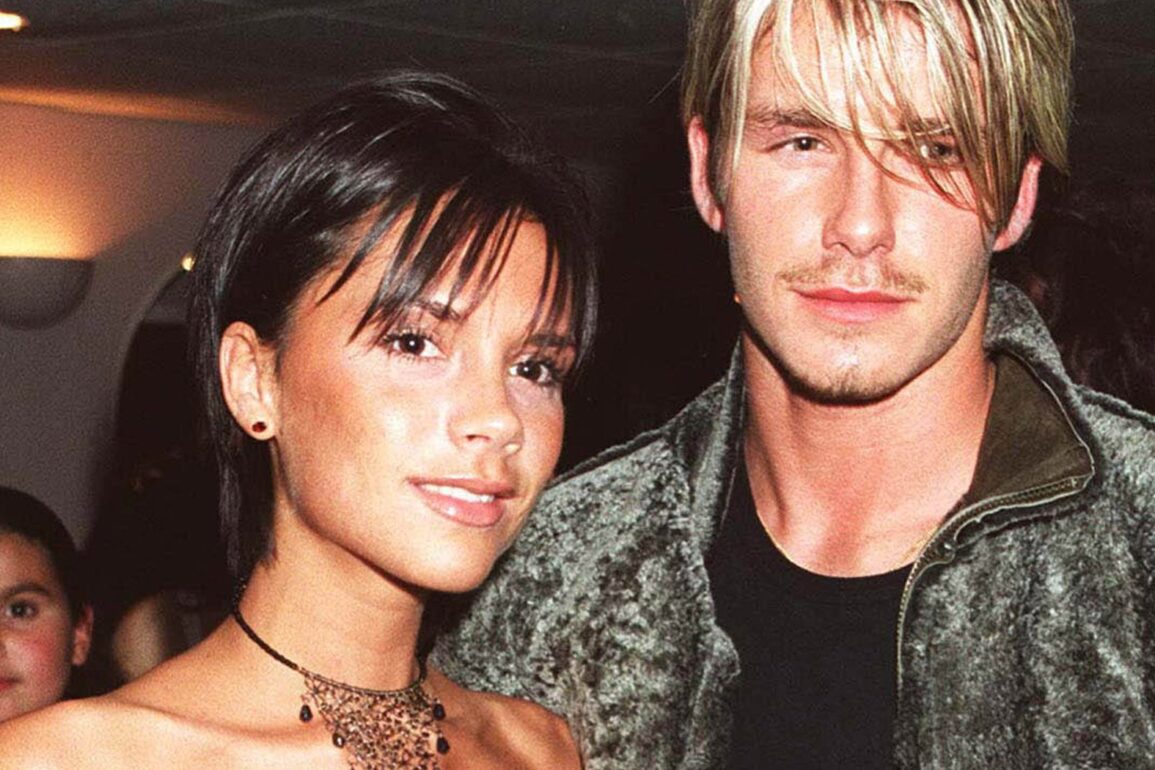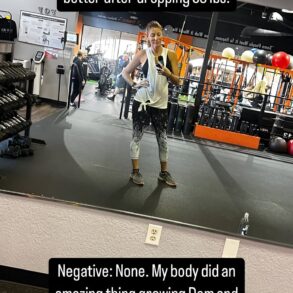
Netflix’s Beckham is, unsurprisingly, about the eponymous David: the soccer legend, fashion and underwear star, adopter of many haircuts, global icon, and cleaner of candles (yes, really). It is also about his decades-long relationship with the Posh to his Becks, aka Victoria Beckham (née Adams) — and as a result, it resurrects a background story from David’s stratospheric rise to fame: the absolutely vile treatment of Victoria by the tabloids.
I hasten to add that Victoria was not alone in being bullied by the press. While the first episode of the docuseries is dedicated to the high romance of the early days of their relationship (he used to drive for four hours to sit with her in a parking lot!), the second explores what happened after David’s infamous red card while playing for England against Argentina at the 1998 World Cup, when the soccer player was subjected to “absolute hate [and] public bullying to another level,” as Victoria recalls.
“He was broken,” she says, noting that spending time with the Spice Girls afforded him some modicum of privacy. “He was absolutely broken. He was in pieces.”
It wasn’t long before the tide turned against Victoria — and it seemingly began with the birth of the couple’s first son, Brooklyn, in 1999. “I remember the headlines, ‘Too Posh To Push,’” continues the fashion designer. “I wasn’t too posh to push! I was told that it wasn’t safe for me to go into labor.”
The couple were allegedly subjected to death threats, kidnapping plots, and a near-constant torrent of abuse — indeed, soccer crowds began singing a song that included the lyric, “Posh Spice takes it up the ass.”
“It felt like we were drowning,” says Victoria. And, while his wife’s presence at his games was “the one thing” that spurred David on to further greatness — resulting in a slew of positive headlines about his performance on the field — the narrative about Victoria did not shift. People began to say that David was “at the beck and call of Mrs. Beckham.” That she was a “distraction.” That she might “jeopardize his career,” solely by existing and having a mind and career of her own.
“I was always the villain,” recalls Victoria. When David announced his 2003 transfer from Manchester United to Real Madrid, she paused to point out that the couple didn’t have anywhere to live, or schools for the children. “But the reality was: we’re moving to Spain,” she says, drawing focus to the fact that the press lambasted her for failing to embrace her new home with a Stepford Wives smile pasted on her face. Many insisted her delay in joining him overseas was an example of her inability to support her husband’s career, when in reality she wanted to settle the children in first. And Spanish Vogue ran a cover line insisting that Victoria “hated Spain because it smelt like garlic,” — which she laughingly points out she categorically never said — prompting the tabloids to fall upon her en masse. They mocked her physical appearance, her eating habits, her career. They accused her of committing the most heinous of crimes a woman can ever commit: being difficult. And, once allegations of David’s alleged affair hit the headlines, things only grew worse for Victoria, who found herself feeling “the unhappiest I’ve been in my life.”
Of course, Victoria is far from the only successful woman to be villainized by the press for daring to be more than her husband’s partner, and for having dreams and thoughts that extend beyond the sphere of marriage. Over the years, we have seen the likes of Sophie Turner, Rose Leslie, Meghan Markle, and countless others raked over the coals for failing to sit at home, silently awaiting their husband’s instruction — and, in the case of the Duchess of Sussex, facing horrendous racist abuse. We will undoubtedly see many more women subjected to the same fate by the paparazzi, too.
“The British press is known for tearing down women. More recently, Meghan Markle felt the brute force of the tabloids who were quick to spread rumors and untruths,” explains Dr. Daria J. Kuss, co-author of Internet Addiction and associate professor in psychology at Nottingham Trent University.
“These stories sell, which is why reporters write them. They evoke a strong emotional response in us, drawing us to those stories, if we agree or disagree with the headlines. However, there needs to be an understanding that because people buy these stories, engage with them, a perpetuating cycle is created, where more such stories emerge, to be read and spread.”
Dr. Rosalind Gill, British sociologist, feminist cultural theorist, and author of Perfect: Feeling Judged On Social Media, agrees, adding, “Hate directed at female celebrities is a mainstay of media coverage of them: their bodies, their weight, their relationship choices, their fashion — nothing is too trivial to be picked over by a hostile media that sells papers and delivers clicks with pictures of stretch marks, cellulite, body hair, makeup and fashion mistakes or weight loss or gain.”
Dr. Gill goes on to explain that, while it’s all too easy to dismiss these stories as the norm (no matter how tragic that may feel), they are actually having an overwhelmingly negative effect on the women and young girls who see them.
“My recent research with young women shows they feel they live in a world where women have to be perfect all the time — but even this may not be enough to avoid being subject to vile comments,” she says.
“Young women are fearful on their own social media of getting it wrong in some way — posting a picture that doesn’t look good enough, posting a picture that looks like it has been edited or filtered, showing too much flesh or not enough flesh, posting too much or too little — the list of ways young women think they can fail and risk hostile comments is endless.”
Dr. Gill adds: “My new book shows us that living in a culture where women are constantly scrutinized and criticized affects all women. Young women have told me how upset they are to see Adele attacked for losing weight, and how distressing it is to see Love Island contestants being constantly torn to pieces.” She recalls a young Black student, Tanisha, saying that even if you don’t experience hate directly yourself, the impact of seeing comments on other women’s feeds is frightening and chilling. “There’s sexual comments, there’s hateful comments, violent comments,” Tanisha told Dr. Gill. “And I’m sure that people who have a lot of followers don’t even have time to look at the comments but just the fact that people can post things like that and it’s there. So if a regular user like me is just scrolling through the comments I can see that. And it is a lot. It’s a LOT. It makes me feel really scared and angry.”
Victoria Beckham may not be the star of Netflix’s documentary, but it’s important we learn from the lessons she shares as she supports her husband in his latest endeavor. It’s important, too, that we recognize the toxic treatment she has endured at the hands of the national press — and that she is owed more than a simple apology from the editors responsible at the time.
As Dr. Kuss states: “Only by disengaging with these stories can the situation be changed. In addition to this, there should be increasing regulation of tabloids, increased fines for misrepresentation and unethical reporting methods.”
Exactly. There’s a reason, after all, that the main Victoria-focused soundbite being pulled from the documentary isn’t about the way she was torn apart by the paparazzi, but about her asserting that she was working class (despite being driven to school in a Rolls-Royce). It’s easier to reduce her to nothing more than her Posh persona — and for everyone who laughed at those awful headlines in the 00s, it’s probably also easier to ignore the role they played in making yet another woman feel desperately unhappy.
This post was originally published on this site be sure to check out more of their content.









